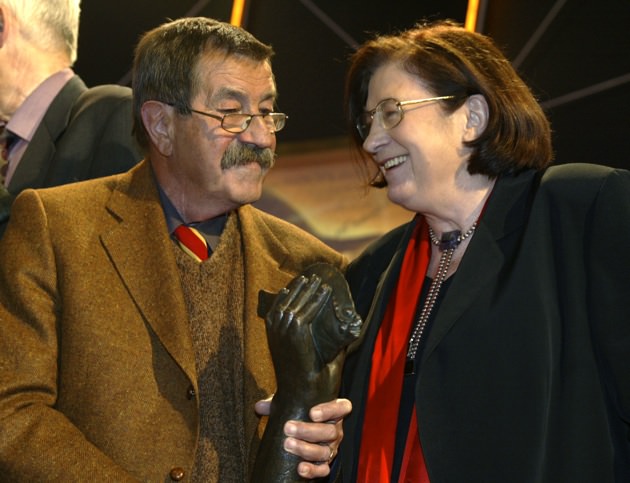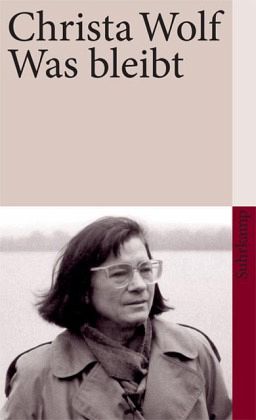The German writer Christa Wolf, one of the most prominent and controversial novelists of her generation, died on December 1 at the age of eighty-two. At a memorial gathering at the Berlin Academy of the Arts, Günter Grass, her colleague and longtime friend, delivered the following eulogy, published here for the first time in English. Grass titled his remarks “What Remains,” which is also the title of a story Wolf published in 1990, deriving from the final line of Friedrich Hölderlin’s poem “Andenken” (“Remembrance,” c. 1803): “Was bleibet aber, stiften die Dichter” (What remains, however, is what the poets create).
Grass’s polemical tone reflects the bitterness of the so-called Literaturstreit, the literary controversy occasioned by Wolf’s story, which was directly connected to the fall of the Berlin Wall and German reunification. It was a debate about the merits of East German writers who, like Wolf, chose to stay in the German Democratic Republic rather than emigrate to the West. Her story “What Remains,” written in 1979 but not published until after the Berlin Wall came down a decade later, is a thinly fictionalized account of how the Stasi spied on her and her husband. The critics whom Grass pillories accused Wolf of waiting to publish the story until it was safe to do so and suggested her work was compromised by her loyalty to the East German state.
In his eulogy, Grass seeks to show the hypocrisy in that charge. As Ian Buruma put it in a 1990 essay on Wolf, “To demand courage in another person is always a tricky business when one is not exposed to the same dangers oneself.” Grass does not mention the epilogue to the Literaturstreit: in 1993, after reviewing the forty-two volumes of files the Stasi amassed on her and her husband, Wolf revealed in an article in the Berliner Zeitung that from 1959 to 1962, at the beginning of her career, she herself had been an “informal associate” of the Stasi—a so-called IM or informeller Mitarbeiter—and had discussed fellow East German writers and their publications with Stasi agents. Some of her critics became more sympathetic after she voluntarily published this information; Frank Schirrmacher, one of the critics who initiated the attack against her in 1990, now wrote that she “had not incriminated anyone in her reports but only reported amicably about upstanding comrades and talented colleagues.” Yet her reputation remained affected, making it difficult to assess her work dispassionately. While she continued to publish steadily until shortly before her death, many readers regard her earlier novels as her best work, especially The Quest for Christa T. (1968) and Patterns of Childhood (1976).
—David Dollenmayer
##What Remains
Christa Wolf belonged to the generation in which I also count myself. We were stamped by National Socialism and the late—too late—realization of all the crimes committed by Germans in the span of just twelve years. Ever since, the act of writing has demanded interpreting the traces that remain. One of Christa Wolf’s books, Patterns of Childhood, responds to that imperative, exposing her successive immersions in brown-shirted dictatorship and the doctrines of Stalinism. False paths credulously followed, stirrings of doubt and resistance to authoritarian constraints and beyond that, the recognition of one’s own participation in a system that was crushing the utopian ideals of Socialism—those are hallmarks of the five-decades of writing that established Wolf’s reputation, a journey that leads book by book from The Divided Sky (1963) to her final work, Stadt der Engel (“City of Angels,” 2010); and the books remain.
To pick one out: “What Remains” is the title of a story published in June 1990 by Aufbau Verlag in the East and Luchterhand Verlag in the West. Even before it was available to East and West German readers, some West German journalists—the sort who assumed they were history’s victors and the hour of reckoning was at hand—ignored the embargo and struck. Christa Wolf, the celebrated author who had been much-praised for her resistance, the 1980 recipient of the Büchner Prize, Germany’s most prestigeous literary award, who was mobbed by enthusiastic students two years later as she delivered her Frankfurt Lectures on Poetics, Christa Wolf, whose voice had been heard in both Germanies, was now—the Wall hardly having fallen—subjected to an unending barrage of words. It was like a public execution. The weekly Die Zeit and the daily Frankfurter Allgemeine Zeitung launched the attack on June 1 and June 2, 1990. Ulrich Greiner and Frank Schirrmacher set the tone that, reverberating among a large pack of journalists, grew into a howling wolves’ chorus. The few dissenting voices were drowned out.
What had caused so much malicious will to destroy? A text written in the summer of 1979 whose themes were doubt, self-doubt, and the eavesdropping and overt surveillance of Christa Wolf and her husband by the State Security Service of the GDR. From the security of their own desks and intoxicated by the sort of gratuitous courage that seems to flourish in editorial offices like a potted plant, these critics accused her of having been too cowardly to publish her story as soon as she had written it. To do so, claimed Ulrich Greiner, “would surely have been the end of Christa Wolf as a state poet and probably have resulted in exile.” From his safe corner he asserted magnanimously that “she could easily have found shelter in the West.” And Frank Schirrmacher went so far as to accuse her in the plural: “Everyone recognizes that these are sentences from 1989, not 1979.” Neither acknowledged that it also took a decade for Sommerstück (“Summer Piece”), the novel she wrote after “What Remains,” to be published in the GDR.
Advertisement
What a prodigious amount of hypocritical outrage from the pens of journalists who had never been subject to state censorship, but who officiously and opportunistically served the zeitgeist.
Led by powerful and influential newspapers, the press campaign of 1990 continued on, again and again springing back to life. Echoes of it can even be heard in some of her obituaries. It was especially the term Gesinnungsästhetik [an aesthetics based on policial convictions], coined to describe the work of Wolf and many other post-war German authors, that to this day inspires the petty minds that want to lock up literature and its creators in a piece of real estate known as the Ivory Tower. Hard on its heels, the personalized neologism Gutmensch [do-gooder, politically correct person], an expression of the prevailing cheap cynicism, came into circulation and was posthumously applied to Heinrich Böll. At this late date, after Christa Wolf’s death, we should probably not expect that the spokesmen of that bygone campaign might apologize in print, if only to acknowledge the pain their odious behavior caused. They obviously lack the self-doubt that Christa Wolf evinced all her life—in excess, in my opinion.
1990! Why do I linger in the morass of the year “What Remains” was published? Because it was the year our friendship began. We saw each other frequently, exchanged letters. Although Christa was at pains to keep her composure, one could see how much she was wounded by the unceasing attacks. What had been done to her in her own country, a country she loved in spite of everything, now continued in a similar, so to speak pan-German vein, and protected by a shield called “freedom of expression.” Slanders, misquotations, relentless attempts at character assassination. That shameful behavior is also what remains. That’s how sordid things were in the year of Germany’s reunification.
But what remains, above all, are her many books. At a time when East and West, bristling with weapons, faced off in rigid ideological confrontation, she wrote books that crossed and overcame this divide, books that have lasted: the great, allegorical novels, the personal account of illness and pain. And it was Christa Wolf who wrote the book Störfall (“Accident”) after the atomic disaster in Chernobyl, a book that foresaw its recurrence at Fukushima—a book that imagined all of us sucked into a catastrophic descent, at the end of which even the hopeful question, “What remains?,” will no longer admit subjunctive answers, and will instead become empty of meaning.




